Bad breath: treatment, causes
From this article you will learn:
- bad breath - causes, treatment,
- how to get rid of bad breath,
- remedy, medicine for bad breath at home.
Bad breath is a symptom of a number of diseases and is associated with the activity of pathogenic microorganisms (bacteria). Bad breath has the professional name "Halitosis". Below we will talk about why the breath smells, and how specialists treat halitosis.
Bad breath in a child has the same causes as in adults, so everything said below will equally apply to children. The smell from the mouth of a baby is also a consequence of insufficient oral hygiene, together with an improper feeding regimen (on demand).
Bad breath: causes
The causes of bad breath are most often associated with untreated dental and gum disease, as well as chronic diseases of the tonsils and gastrointestinal tract. Below we will consider all the main reasons, as well as tell you how to remove bad breath in each case:
1. Soft microbial plaque and hard dental deposits -
Dental plaque is the most common cause of bad breath. With insufficient hygiene in the area of the necks of the teeth, one can often notice accumulations of soft microbial plaque (Fig. 1), which are visible to the naked eye. Such plaque forms very quickly, it is enough to skip brushing your teeth 1 time.
If soft plaque is not removed from the teeth in time, then it mineralizes with calcium salts contained in saliva, and as a result turns into hard dental deposits - they are also called (Fig. 2-3). Hard dental deposits can be both supragingival (in this case they are clearly visible above the gum surface), and subgingival - in this case they are located under the gum and only a dentist can detect them.
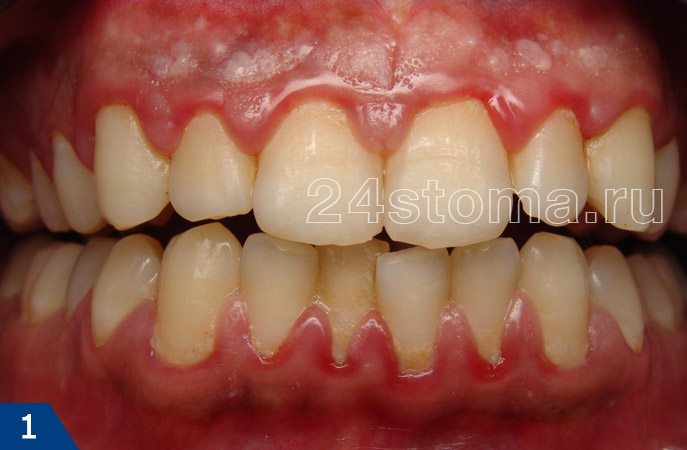

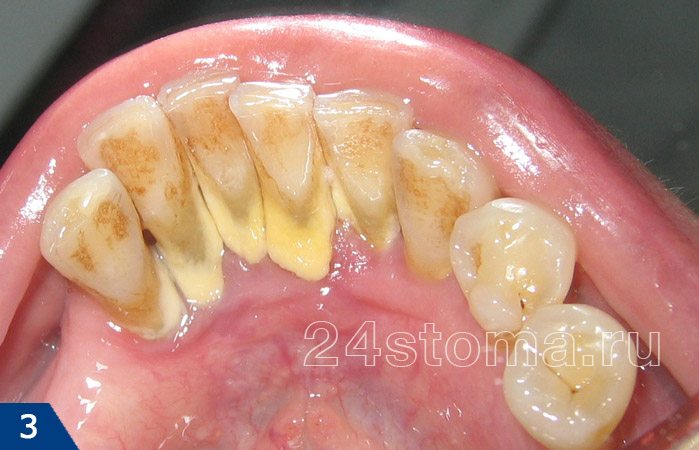
Both soft and hard dental deposits consist of colonies of microorganisms that produce waste products (hydrogen sulfide compounds). Accordingly, if they are present in the oral cavity, there will always be an unpleasant aftertaste in the mouth, and when talking and breathing there will be a terrible smell from the mouth. Due to habituation, a person may not notice an unpleasant smell coming from him (when talking or breathing through his mouth), but other people will always feel it.
How to remove bad breath in this case -
it is necessary to remove solid supra- and subgingival dental deposits. This can only be done by a dentist. There are two main methods of professional oral hygiene at the dentist:

2. Inflammatory gum disease -
If you have symptoms of bleeding gums, soreness when brushing your teeth, swelling of the gum papillae, cyanosis or redness of the marginal part of the gums, then these symptoms indicate that you have (Fig. 5-6). This disease is always present in people with poor oral hygiene.
If, in addition to these symptoms, you are concerned about tooth mobility, suppuration from under the gums, and exposure of the necks of the teeth, then such symptoms are characteristic of gum inflammation called (Fig. 7). This disease is a consequence of untreated gingivitis in time, and is characterized by the destruction of the bone around the teeth, the destruction of their attachment to the gums and the appearance of their mobility over time.
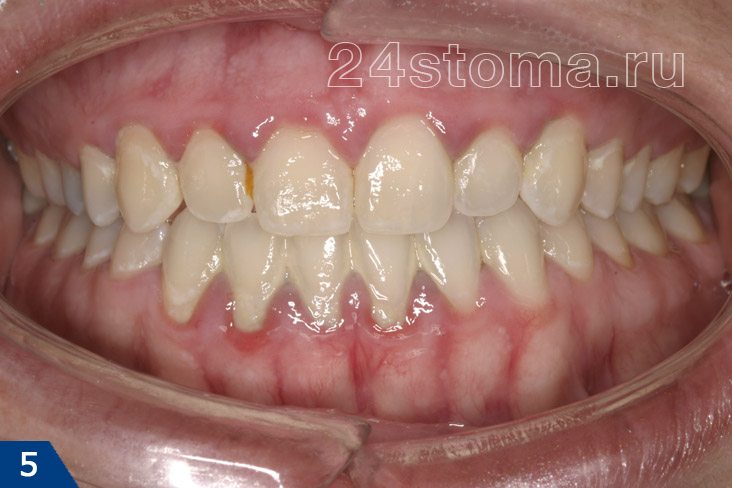
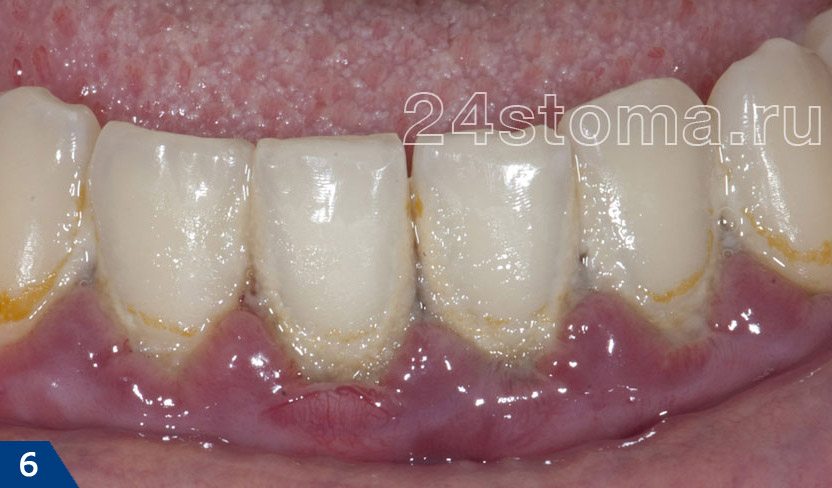
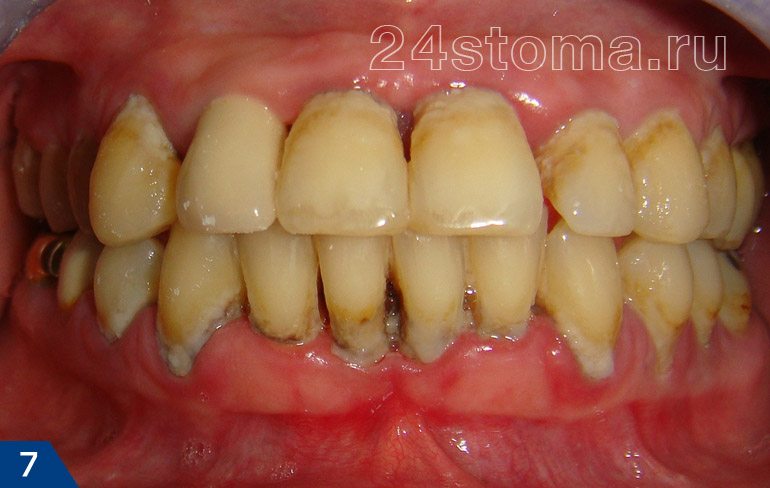
Initially, the cause of these diseases is poor oral hygiene, leading to the accumulation of soft microbial plaque and hard tartar on the teeth. With the development of inflammation of the gums, the number of pathogenic microorganisms and the waste products they release sharply increases, which further increases the unpleasant odor. With periodontitis, serous-purulent exudate can be released from under the gums, which makes a significant contribution to the appearance of bad breath.
How to get rid of bad breath if you have gum disease
First of all, you need to remove the cause of gum disease - soft microbial plaque and hard dental deposits. We have already said above that this can be done with the help of ultrasound at the dentist's appointment. There are simply no home / folk remedies here.
After the doctor has removed dental deposits for you, it is prescribed (the course of treatment is 10 days). Typically, the complex consists of an antiseptic rinse (0.05% chlorhexidine solution) and an anti-inflammatory gum gel (for example, HolisalGel). You can carry out such treatment at home, but it will be effective only if the dentist has previously removed all dental deposits from your teeth and taught you how to brush your teeth correctly.
3. Food residue between teeth -
Most often, putrid breath is associated with poor oral hygiene, for example, when a person does not use dental floss to clean the interdental spaces from food debris. Surely many of you have felt the stink of the mouth of colleagues who had a bite to eat at work, but did not brush their teeth.
Food residues between teeth cannot be removed by brushing, chewing gum or rinsing. Fragments of food in the interdental spaces are immediately populated by microorganisms that begin to digest food (i.e., the process of decay occurs). The result is an unpleasant smell.
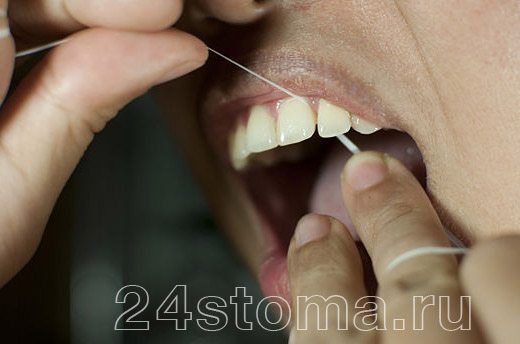 How to get rid of bad breath if hygiene suffers -
How to get rid of bad breath if hygiene suffers -
You just need to improve your oral hygiene. After each meal, clean the interdental spaces with dental floss. After you have used dental floss, you need to brush your teeth with a brush and paste. But if you are at work or at a party, then after flossing, you can chew gum for 10 minutes.
Remember that chewing gum without flossing is ineffective. In addition, teeth should be brushed for the first time 10 minutes after eating, no later. It is also necessary to avoid snacking (having a bite means you need to brush your teeth), and drinking sugary drinks between main meals.
The best remedy for bad breath is cured teeth. And good oral hygiene is the best example of how to eliminate bad breath at home. You can read more about how to brush your teeth properly in our article:
→
4. Carious defects of teeth -
Carious defects are populated by a large number of pathogenic microflora, and 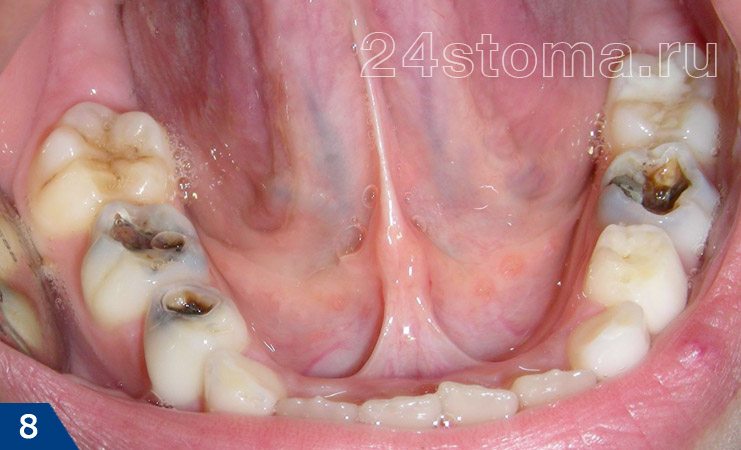 besides this, food residues are retained in them. Food, tooth tissues rot under these conditions, which causes a strong breath. If you have untreated teeth, then you can eliminate bad breath only if you cure them.
besides this, food residues are retained in them. Food, tooth tissues rot under these conditions, which causes a strong breath. If you have untreated teeth, then you can eliminate bad breath only if you cure them.
Most often, caries forms in, i.e. exactly where food debris gets stuck if you floss regularly. These carious defects are not visible for a long time, and only a dentist can detect them during a careful examination of the teeth. Therefore, if you do not see caries on your teeth, this does not mean at all that you do not have it.
5. Tooth decay under crowns -
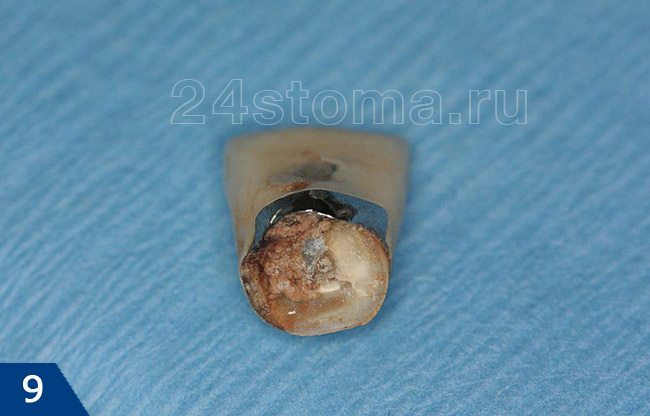 Many people complain that an unpleasant smell comes from under a particular tooth under the crown. These are nothing but symptoms. The reasons for the onset of decay are most often: poor fit of the edge of the crown to the tooth and poor oral hygiene.
Many people complain that an unpleasant smell comes from under a particular tooth under the crown. These are nothing but symptoms. The reasons for the onset of decay are most often: poor fit of the edge of the crown to the tooth and poor oral hygiene.
How to remove bad breath if the tooth rots under the crown -
it is necessary to remove the crown (bridge), and if the tooth can be restored, then it is restored with filling material and a new crown is made. If the destruction process has gone too far, then the tooth can be removed.
6. Chronic tonsillitis -
Bad breath and in people with chronic inflammation of the tonsils. If a person has weak immunity or there is a lot of infection in the oral cavity, periodic acute inflammation of the tonsils during a cold can turn into a sluggish chronic form of inflammation with periodic exacerbations. Very often, bad breath can be found precisely in people with such a sluggish chronic inflammation of the tonsils, or after follicular tonsillitis (in which microabscesses with pus form in the tissue of the tonsils).
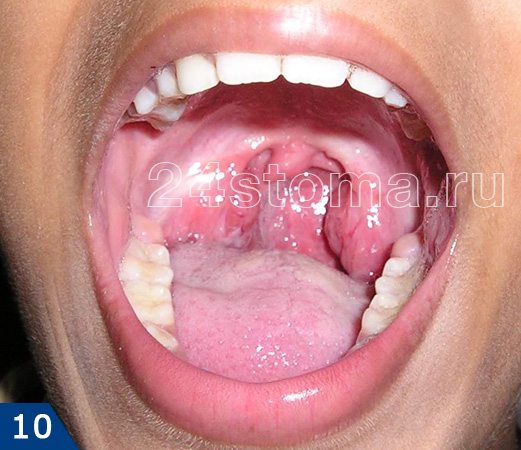 Bad breath: Treatment for tonsillitis implies that the entire dental infection is needed first anyway, as very often the cause of tonsillitis is an infection located nearby (in carious teeth, inflamed gums, dental deposits).
Bad breath: Treatment for tonsillitis implies that the entire dental infection is needed first anyway, as very often the cause of tonsillitis is an infection located nearby (in carious teeth, inflamed gums, dental deposits).
Secondly, you need to consult an ENT doctor, who, if necessary, will prescribe you treatment, physiotherapy, and possibly immunostimulating therapy. The latter can be very effective if the cause of tonsillitis is reduced immunity and frequent colds.
7. Diseases of the gastrointestinal tract -
We are talking about diseases such as gastritis, peptic ulcer of the stomach and duodenum. During the period of exacerbation of these diseases, an extremely unpleasant putrefactive odor can be felt from the mouth, and the person himself usually does not feel it, but those around him do not.
How to eliminate bad breath on the background of gastritis ... -
here treatment by a gastroenterologist is definitely necessary, depending on the localization of inflammation, increased or decreased acidity, completely different groups of drugs can be prescribed.
8. Dysbacteriosis of the oral cavity -
With frequent use of toothpastes and rinses containing antibiotics and antiseptics (for example, triclosan, chlorhexidine), the natural balance of microflora in the oral cavity is disturbed. During the use of such products, of course, there will be no smell from the mouth. However, as soon as you stop using them, a violation of the composition of the microflora can manifest itself as an unpleasant odor. Remember that toothpastes and rinses with triclosan or chlorhexidine should not be used for more than 3 weeks.
Before treating oral dysbacteriosis, you must first check the absence of hard dental deposits, caries, inflammation of the gums, tonsils, gastrointestinal tract ... If all this is absent, and hygiene is normal, then it remains only to assume the presence of dysbacteriosis. The balance of microflora and local immunity in the oral cavity will help restore such a drug as Imudon. It is available in the form of lozenges.
9. Breathing through the mouth -
By the way, a predisposing factor to the appearance of bad breath is mouth breathing. Breathing through the mouth leads to constant overdrying of the oral mucosa, more rapid formation of dental deposits on the teeth, and contributes to the development of dysbacteriosis. All these factors contribute to the appearance of an unpleasant odor.
Breath odor: how to get rid of breath through the mouth ...
if you have mouth breathing, then you probably need to contact an ENT doctor who will help you correct the curvature of the nasal septum and cure chronic rhinitis, which may be the causes of mouth breathing.
10. Lung diseases -
In some cases, bad breath is associated with an infectious or oncological lung disease. This is not so common, but for the sake of completeness, we have included this item.
How to get rid of bad breath at home
The smell from the mouth in the morning is not always a sign of various diseases, because. overnight, the number of microorganisms in the oral cavity increases significantly. However, if you have a "cat in your mouth" in the morning, then this is not normal, and you need to look for reasons ... And it will certainly be something from what we have listed above.
Treatment at home (rinsing, mouth odor spray) will only mask the odor in nature, because. will not remove the cause of the unpleasant odor. You can poison the body for an arbitrarily long time with toothpastes and mouthwashes with antiseptics and antibiotics, but prolonged use of such products will only lead to the progression of the causes of bad breath. Therefore, a visit to the dentist to determine the cause of the smell is a must.
How to eliminate bad breath at home: hygiene products
Zinc-containing oral hygiene products will be very effective. zinc neutralizes hydrogen sulfide compounds, the appearance of which leads to an unpleasant odor. Examples of products with zinc -
With xerostomia, i.e. when there is dryness of the mucous membrane due to lack of saliva or oral breathing, special toothpastes are used that contain components that moisturize the oral mucosa for a long time. An example would be LACALUT Flora toothpaste.
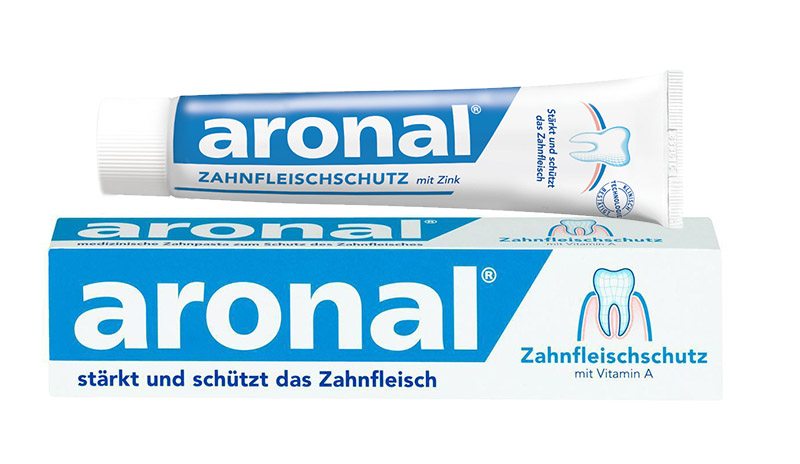


Important : the majority of other rinses and toothpastes positioned as odor removers contain mainly only antiseptics that inhibit the development of bacteria that produce hydrogen sulfide compounds. The smell itself in such products is masked by deodorizing additives. With prolonged use, antiseptics lead to oral dysbacteriosis and the appearance of an even more persistent odor after the abolition of such agents. That is why such funds are not recommended to be used for more than 2-3 weeks.
The smell of acetone from the mouth: causes
The smell of acetone from the mouth is a symptom that suggests that a child or adult has a disease such as diabetes mellitus. Therefore, if you feel such a smell in a child's mouth or in yourself, then you must urgently contact an endocrinologist for a consultation.
We hope that our article on the topic: Breath odor what to do turned out to be useful to you!



